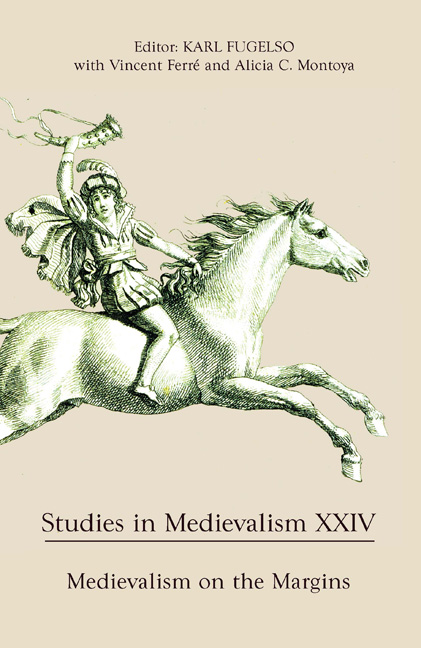Book contents
- Frontmatter
- Acknowledgments
- Contents
- List of Illustrations
- Volume XXIV 2015
- Editorial Note
- I Medievalism on the Margins: Some Perspective(s)
- 1 Medievalism in the Margins: Paratexts and the Packaging of Medieval French Literature
- 2 Medievalism Studies and the Subject of Religion
- 3 Pop Medievalism
- 4 Ecomedievalism: Applying Ecotheory to Medievalism and Neomedievalism
- 5 Whiteness and Time: The Once, Present, and Future Race
- 6 A Desire for Origins: The Marginal Robin Hood of the Later Ballads
- 7 Women, Queerness, and Massive Chalice: Medievalism in Participatory Culture
- 8 “Constant inward looking,” Medieval Devotional Literature, and the Concordium-Fruitlands Library
- II Trans-Atlantic Medievalism(s)
- III Other Interpretations
- Contributors
8 - “Constant inward looking,” Medieval Devotional Literature, and the Concordium-Fruitlands Library
from I - Medievalism on the Margins: Some Perspective(s)
Published online by Cambridge University Press: 05 December 2015
- Frontmatter
- Acknowledgments
- Contents
- List of Illustrations
- Volume XXIV 2015
- Editorial Note
- I Medievalism on the Margins: Some Perspective(s)
- 1 Medievalism in the Margins: Paratexts and the Packaging of Medieval French Literature
- 2 Medievalism Studies and the Subject of Religion
- 3 Pop Medievalism
- 4 Ecomedievalism: Applying Ecotheory to Medievalism and Neomedievalism
- 5 Whiteness and Time: The Once, Present, and Future Race
- 6 A Desire for Origins: The Marginal Robin Hood of the Later Ballads
- 7 Women, Queerness, and Massive Chalice: Medievalism in Participatory Culture
- 8 “Constant inward looking,” Medieval Devotional Literature, and the Concordium-Fruitlands Library
- II Trans-Atlantic Medievalism(s)
- III Other Interpretations
- Contributors
Summary
In 1843 the transcendentalist Amos Bronson Alcott transported James Pierre-pont Greaves' theosophical library from the “Concordium,” an intentional community just outside of London, to “Fruitlands,” his own communal farm outside Harvard, Massachusetts. Henry David Thoreau would laud the collection as a great “cabinet of mystical and theosophic lore.” That cabinet contained, among books on Platonism, alchemy, witchcraft, occultism, veganism, and modern mysticism, three medieval devotional texts: Julian of Norwich's Shewings, Bridget of Sweden's Revelations, and Thomas à Kempis' Imitation of Christ. The appearance of these three texts in Greaves' library in the company of Roger Bacon, Cornelius Agrippa, and Paracelsus attests not only to a new readership outside of traditional Christianity for medieval devotional literatures but also to an emerging association between medieval devotion, the occult, and disciplines of the self.
In the second quarter of the nineteenth century, in response to the harsh social realities of industrialization and the intellectual aridity of enlightenment empiricism, the men and women at the Concordium and Fruitlands lived out an experiment in isolationist communal living and collective action under the leadership of Greaves and Alcott. In 1838 Greaves placed his library at the intellectual center of his community “The Concordium, or Harmonious Industrial College,” which he billed as “a home for the affectionate, skillful and industrious, uncontaminated by false sympathy, avaricious cunning, or excessive labour.” Greaves was a charismatic figure who attracted sufficient disciples from his life as a merchant and as a self-styled mystic to fund himself, a school, and a residential community, and to equip a library of a thousand carefully chosen books. Fruitlands was established in 1843 by Alcott and Charles Lane, one of Greaves's English associates.
The transcendental lifestyles and literacies undertaken at the Concordium and Fruitlands might be understood as efforts to form meaningful attachments to the things of an increasingly mechanized world. Jane Bennett argues that “technologies” or “tactics” of the self, including reading and ascetic disciplines, can cultivate a sensibility attuned to enchantment.
- Type
- Chapter
- Information
- Studies in Medievalism XXIVMedievalism on the Margins, pp. 75 - 88Publisher: Boydell & BrewerPrint publication year: 2015



